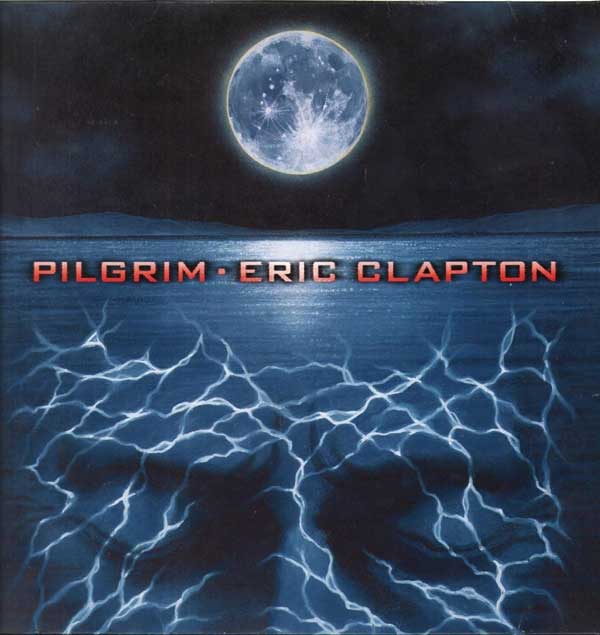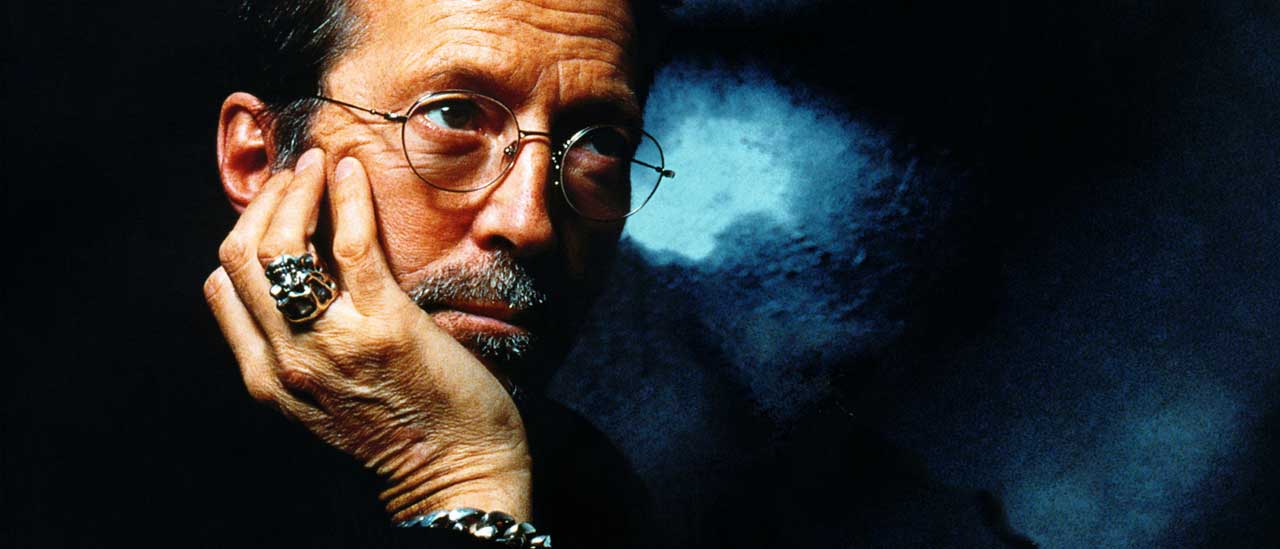
My Father's Eyes
River of Tears
Pilgrim
Broken Hearted
One Chance
Circus
Going Down Slow
Fall Like Rain
Born in Time
Sick and Tired
Needs His Woman
She's Gone
You Were There
Inside of Me
The nine years since he’d released his previous album of original material, 1989’s superb Journeyman, had been fraught with trauma for Eric Clapton. Having overcome his 80s alcoholism, Ol' Slow Hand then lost tourmate Stevie Ray Vaughan and three crew members in a 1990 helicopter crash and his four-year-old son Conor in a tragic fall in 1991, prompting the heartbreaking Tears In Heaven.
He’d also recently begun a relationship with a woman 31 years his junior. No wonder Clapton sounded exhausted on 1998’s Pilgrim, his pace slowed to a casual jazz shuffle, his voice careworn, his production – perhaps down to the soporific touch of Climie Fisher’s Simon Climie – solemnly inoffensive.
Two of Pilgrim’s tracks are about Conor: the heartfelt but surprisingly upbeat My Father’s Eyes and Circus, a forlorn flamenco about his son’s last trip to Chipperfield’s. The latter – and the sense of loss that infects the sombre River Of Tears – is deeply moving, but the aura of resigned glumness dampens Clapton’s trademark roar into a tired Albert Hall slouch on the title track, One Chance, Needs His Woman and the Celtic-piped Broken Hearted.
He’s only roused by his new romance on Fall Like Rain and You Were There; otherwise it’s as if, after decades of pouring his heart and soul into other people’s blues, his own sucked the life out of him

Every week, Album of the Week Club listens to and discusses the album in question, votes on how good it is, and publishes our findings, with the aim of giving people reliable reviews and the wider rock community the chance to contribute.
Other albums released in March 1998
- Contact from the Underworld of Redboy - Robbie Robertson
- III - Van Halen
- Snake Bite Love - Motörhead
- Virtual XI - Iron Maiden
- Twilight in Olympus - Symphony X
- XIII - Rage
- Colma - Buckethead
- Space Heater - Reverend Horton Heat
- Boggy Depot - Jerry Cantrell
- 12 Bar Blues - Scott Weiland
What they said...
"The deadened sonics would make Pilgrim a chore even if there were strong songs on the record, but only a handful of tunes break through the murk. Considering that Journeyman, his last album of original material, was a fine workmanlike effort and that From the Cradle and Unplugged crackled with vitality, the blandness of Pilgrim is all the more disappointing." (AllMusic)
"Pilgrim is easily Clapton’s most ambitious, introspective piece of work since his days with the legendary, lacerating Derek and the Dominos. Paradoxically both slickly polished and surprisingly intimate, the album is a loosely themed soul-song cycle in the tradition of Marvin Gaye." (Rolling Stone)
"With its mournful tone and its surfeit of mid-tempo, string-enhanced ballads (even the orchestra is forced to play blues licks), Pilgrim does have the feel of a somber musical wake. But it never matches the emotional intensity and visceral passion of his previous pain-as-art masterpiece, Layla." (Entertainment Weekly)
What you said...
Chris Elliott: A brief review would be simply more dull than usual. Imagine Sade's backing band on a really bad day and you'll be close.
I have never got the appeal/legend status of Clapton. Yes Cream were good – Layla is worth it's reputation – but 1969 is a long time ago. He represents most of what I dislike about the 70s (coke-addled self-indulgence) followed by the dullest coffee table blues through the 80s. Being part of the reason behind Rock Against Racism - for all the wrong reasons - didn't make me receptive.
Dale Munday: Once upon a time there was a renowned guitar player, so revered in fact that some called him god (whatever that means). And then one day...
Chris Downie: We all know of the well-worn cliché about the legacy artist who has the black sheep (sometimes even two or three) in their back catalogue, that album that serves as either a creative misstep, taken during difficult personal/professional circumstances, or under record label duress, or a contrarian choice of hidden gem for diehards who will proclaim the masses just 'didn't get it' at the time.
In truth, there's little to either love or hate about this period in Clapton's career, which puts it in neither of the aforementioned camps, despite the fact many have continually given it a wide berth. Instead, it stands on its own as a statement made at a particular time in the artist's life, which has some flashes of greatness but is overshadowed by the weight of other, more illustrious eras. Definitely worth a listen, if only for completion's sake. 7/10.
Gary Claydon: Clapton's desire to make "the saddest album ever" and the reasons for that are well documented. However, Pilgrim is so determinedly understated it's almost soporific. Intimate and highly introspective, Clapton's vocals and guitar have a pleasing subtlety to them in places but unfortunately, the production, particularly the drum machines and the (frankly annoying) backing vocals overwhelms everything and never really lets the emotion break through.
The title track is the best thing here but overall, the attempt to add a contemporary feel doesn't really work. The material is largely forgettable and Pilgrim is at least four tracks too long. As cathartic as it may have been for the man himself, the end result is an album that is something of a chore, rather than a pleasure, to listen to.
Greg Schwepe: When you have a career as long as Eric Clapton has and your album output veers from your tried and true music to something slightly different, you’re bound to tick off your hardcore fans, but gain some new ones along the way. Pilgrim might be a good example of this as your "I won’t listen to anything past Slowhand’" fans give way to "I like the new Eric Clapton song I heard on the Lite Rock station" fans. Along with fans he picked up after the success of the Unplugged album.
I call this “Adult Contemporary Clapton” or “Soundtrack Clapton” (as he had a lot of success with similar songs on movie soundtracks. Can you say Tears In Heaven?). Smooth, grooving songs over this 1 hour and 15 minute album (too loooooong!).
The feel-good, slow, chugging My Father’s Eyes opens this album. Immediately you hear alongside Clapton’s guitar, the star of this album… the programmed drum beats! They’re here for the entire album. Some may not be a fan of this, but I am.
The next four songs really (and I mean really) test your patience if you are waiting for Clapton to let it rip. That won’t happen until later. River of Tears, Pilgrim, Broken Hearted and One Chance bring more slow, grooving jams. Background vocals and strings complement many of these songs.
Sick and Tired finally has Clapton starting to turn up the volume on his Stratocaster, as this slightly bluesy tune ups the volume and pace a little. Nice tune if you’ve stuck it out to this point. She’s Gone has Clapton dialing it up a little more. Wah-wah filled guitar work and the slinky bass and programmed drums make this the standout song on Pilgrim.
Is this a good Clapton album? Yes! As I mentioned before, will the Clapton purists like it? No! Will the average music fan who stumbles onto it via an Adult Contemporary radio station like it? Yes!
8 out of 10 on this one for me. Not your Father’s Clapton, but one your “Lite Rock” loving Aunt just might like.
Mike Canoe: Eric Clapton's Pilgrim is alright if you like drum machines.
The constant clacking of programmed beats stands out to me more than Clapton's voice or guitar. It's not necessarily bad and often serves as a bedrock for a gentler, warmer Clapton.
Two of the first three songs were very pleasant surprises. River of Tears is as gentle as a lullaby and Clapton's warm voice serves as a nice counterpoint to the despairing lyrics. The title track is also a sublime beauty with Clapton singing in a soft falsetto. One Chance and Circus are also pretty songs aided by cooing background vocals.
With the exception of Sick And Tired, the rest of the album passes by in a metronomic haze. However, it's arguably not good when what catches your attention is Clapton singing about taking a shotgun and blowing his woman's brains out. So, not always a gentler, warmer Clapton then.
Pilgrim has moments of revelation, but over the course of 75 minutes (roughly a minute shorter than an official double album, Layla and Other Assorted Love Songs, for comparison) it becomes more about the end destination than the journey.
John Davidson: Two songs in and I'm already bored. The backdrop to Clapton's singing and guitar playing is utterly monotonous. The vocals emphasise diction over emotion And the guitar work is largely forgettable.
Things improve very briefly with One Chance, which at least has a decent groove, but overall this is bland stuff, dominated by mechanical drumbeats and by the numbers backing vocals.
Adam Ranger: Apparently Clapton asked Steve Gadd how he felt about making the saddest album ever. I think he mispronounced "Dullest"
This is really monotonous and dull, especially the first few tracks. It was an effort to plough through the dirge. To be honest, I nearly gave up.
Somewhere between smooth pop and modern R'n'B (sadly not the maximum R'n'B of The Who or Bo Diddley!)
A couple of the later tracks liven it up a bit, but not enough to give this a good review.
Every artist has the right to change their sound, and we can't always expect the great songs of the late 70s, but Eric is so dull here. Not sad or melancholy in the style of great blues songs, just plain dull.
Philip Qvist: The album starts off promising enough with My Father's Eyes but sadly that's where it ends. Circus was okay and there are a couple of other decent tracks on Pilgrim, but at nearly 75 minutes long, it was an ordeal to listen to it all in one go.
Monotonous vocals, muted guitars and drum machines do not make for a good album, and Pilgrim is dull to the extreme. Having Simon Climie on it as producer, main musician and co-writer of many of those songs just makes an already bad situation even worse.
Eric Clapton has released some very good albums throughout his career, and I would highly recommend his records with Cream and 461 Ocean Boulevard, but this album is definitely not one of them. In short, Pilgrim is a cure for insomnia.
T.C. Grantham: To really understand and appreciate Pilgrim, you have to look into its background as well as look at it as an objective piece of music.
As we all know, Clapton lost his son, Conor, in August 1991. We also know that he wrote the song Tears in Heaven for him. But it wasn’t until this album that he was able to fully purge the pain and darkness from himself. Many of the songs stem from this pain.
Clapton himself has stated that when the emotions started coming up, he played them rather than going back into alcoholism. This may make the album monotonous is some areas, but it was what he was feeling at the time. So, in a way, this album was a form of therapy for himself.
Pilgrim was an album that he had to make. He had to make it to move forward. It may not be everyone’s cup of tea, but it was definitely an important album for Clapton at this stage in his career.
Final score: 5.38 (39 votes cast, total score 210)
Join the Album Of The Week Club on Facebook to join in. The history of rock, one album at a time.

